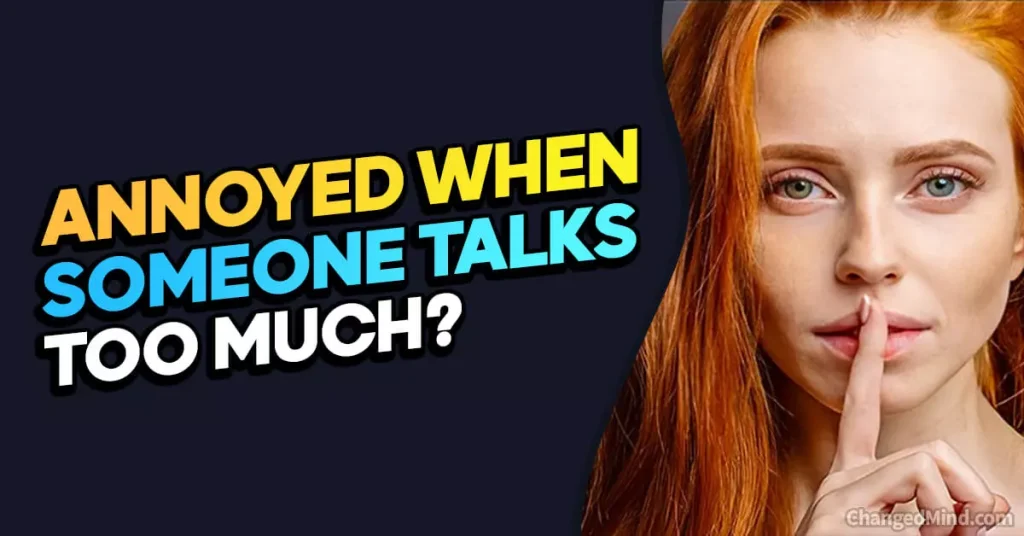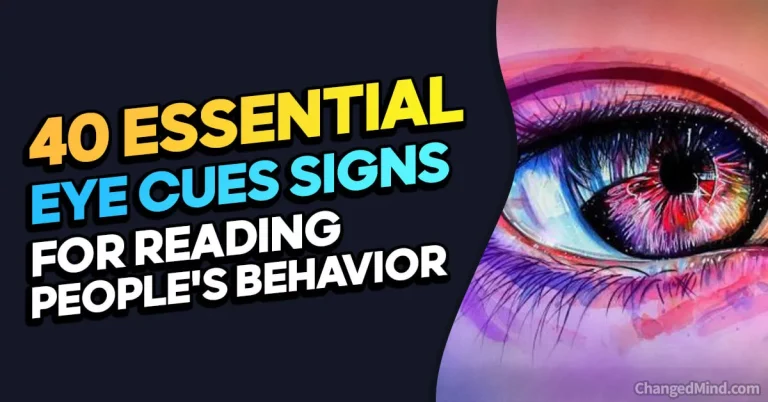Ever found yourself secretly praying for the invention of a “Mute” button for humans? We get it. You’re annoyed when someone talks too much. But why? Well, we’ve got the scoop on the psychology behind it.
Reasons to Keep Reading: In this article, we’ll unravel the mystery behind why you’re annoyed when someone talks your ear off. From the science of irritation to the art of conversation, we’ll explore:
- The Brain’s Breaking Point
- The Power of Pauses
- The Personal Space Invader
- The Lost Art of Listening
- The One-Uppers
- The Never-Ending Storytellers
Get ready to discover why the “Mute” button remains a fantasy and how to survive the chatter!
The phenomena of being annoyed when someone talks too much is a common experience that many people can relate to. Behind this annoyance lies a fascinating psychological explanation. Understanding the psychology behind this annoyance can help shed light on why we react the way we do in such situations.
- Cognitive Overload: One reason for annoyance is cognitive overload. When someone talks excessively, bombarding us with information, our brains can become overwhelmed, making it difficult to process and retain what is being said.
- Interruption of Personal Space: Excessive talking can also infringe upon our personal space and boundaries. When someone dominates a conversation without allowing others to participate, it can feel intrusive and lead to annoyance.
- Lack of Balance in Conversation: An imbalance in conversation is another factor. When someone talks too much, it prevents others from having an opportunity to share their thoughts and experiences, leading to frustration and feelings of being ignored.

Several reasons contribute to the annoyance experienced when someone talks excessively:
- Feeling Ignored: Excessive talkers may fail to actively listen and show interest in other people’s perspectives. This can make us feel ignored or undervalued in the conversation.
- Inability to Share Own Thoughts: When someone dominates a conversation, it can be challenging to find the space to express our own thoughts and ideas. This can lead to a sense of frustration and dissatisfaction.
- Exhaustion from Active Listening: Active listening requires mental effort and engagement. When someone talks incessantly, it can be mentally draining and exhausting, leading to annoyance and impatience.
Individual tolerance to excessive talking can vary based on several factors:
- Personality Traits: People with introverted tendencies may have lower tolerance for excessive talking, as they typically prefer quieter and more balanced conversations. Extroverted individuals, on the other hand, may have higher tolerance levels.
- Communication Style: Different communication styles may influence tolerance levels. People who value active listening and balanced conversations may be more easily annoyed by excessive talkers.
- Cultural Background: Cultural norms and expectations regarding communication can also play a role. In some cultures, talking excessively may be perceived as rude, while in others, it may be more acceptable.
Dealing with excessive talkers can be challenging, but there are strategies that can help:
- Setting Boundaries: Clearly and assertively communicate your need for balance in the conversation, indicating that you would like to have equal opportunities to speak and share your thoughts.
- Advocating for Yourself: If you find that someone continually dominates conversations, politely express your desire to contribute and be heard. It is important to assert yourself in a respectful manner.
- Diverting the Conversation: If the conversation becomes overwhelming or one-sided, try redirecting the topic to allow for more balanced participation. This can help to shift the dynamics and encourage more inclusive dialogue.
By understanding the psychology behind annoyance and implementing effective strategies, we can navigate conversations with excessive talkers in a constructive and balanced way. Key takeaways:
Key takeaway:
- Excessive talking can lead to annoyance: When someone talks too much, it can be irritating and frustrating for others. This annoyance can stem from various psychological factors.
- Psychological factors contributing to annoyance: Cognitive overload, interruption of personal space, and lack of balance in conversation can all contribute to the annoyance experienced when someone talks excessively.
- Reasons behind annoyance: Feeling ignored, inability to share one’s own thoughts, and exhaustion from active listening are common reasons why excessive talking can be annoying.
6 Reasons Why You’re Annoyed When Someone Talks Too Much
Here are six reasons why you might find yourself annoyed when someone talks too much:
- The Brain’s Breaking Point: Your brain can only handle so much information at once. When someone keeps talking without a break, it can overwhelm your cognitive abilities.
- The Power of Pauses: Conversations are like music; they need rests. Constant chatter without pauses can be mentally exhausting.
- The Personal Space Invader: Excessive talking can make you feel like your personal space, both physical and mental, is being invaded.
- The Lost Art of Listening: When someone talks endlessly, it often feels like they’re not interested in what you have to say, which can be frustrating.
- The One-Uppers: Those who always have a bigger, better story can be exhausting. It feels like a never-ending competition.
- The Never-Ending Storytellers: Some people seem to have no “off” switch to their stories, leaving you stuck in a never-ending tale.
Understanding these reasons can help you navigate such situations more effectively and maybe even find ways to enjoy the chatter.
The Psychology Behind Annoyance

Ever wondered why excessive talking can get on your nerves? In this section, we dive deep into the psychology behind annoyance.
From cognitive overload to the interruption of personal space and imbalances in conversation, we explore the various factors that contribute to our irritation levels.
So, fasten your seatbelts and get ready for a fascinating journey through the intricacies of human interaction and the underpinning psychology of annoyance.
Cognitive Overload

Cognitive overload, which occurs when someone talks excessively without giving others a chance to contribute or process, contributes to annoyance. It is the result of excessive mental strain caused by receiving an overwhelming amount of information during a conversation.
Our brains have a limited capacity to process verbal cues, nonverbal cues, and conversation content. When faced with an influx of information, it becomes challenging to focus, retain important details, and respond effectively, leading to cognitive overload.
Imagine being in a meeting where one person dominates the conversation without allowing others to speak. The constant flow of information overwhelms the listeners, causing cognitive overload. They struggle to keep up, understand the points, and participate actively.
To mitigate cognitive overload, it is important to establish a balanced conversation where everyone has the opportunity to speak and listen. Clear conversation guidelines should be set, turn-taking should be encouraged, and pauses should be provided for reflection and response.
Additionally, active listening techniques such as summarizing, asking questions, and paraphrasing should be used to engage with information more effectively and alleviate cognitive overload.
By addressing cognitive overload, individuals can create an environment that fosters open communication and reduces annoyance. It is essential for communication to respect the cognitive limits of all participants.
Talk less, invade personal space more.
Interruption of Personal Space
Interruption of personal space is a major source of annoyance when someone talks excessively. This interruption can be quite bothersome for several reasons:
1. Lack of Privacy: When someone talks nonstop, it invades the personal space of others, making them feel uncomfortable and intruded upon.
2. Overwhelming Presence: Continuous talking overwhelms individuals, leaving no breathing space to think or freely express themselves.
3. Boundary Violation: Excessive talking disregards personal boundaries, leading to irritation and frustration.
4. Conversation Dominance: Talking too much dominates the conversation, hindering others from contributing and disrupting effective interaction.
The interruption of personal space leads to annoyance and discomfort, negatively impacting communication and interpersonal relationships. Effective communication should prioritize allowing all participants to express their thoughts and feelings. By respecting personal space and boundaries, conversations can be more enjoyable and engaging.
In the early 20th century, personal space was not well understood. Research on the effects of personal space interruption has revealed that excessive intrusion can increase stress, irritability, and discomfort.
One famous case highlighting the impact of personal space violation is the “elevator experiment” conducted by psychologist Stanley Milgram. Participants were subjected to a confederate who continuously invaded their personal space. The results clearly demonstrated a correlation between personal space violation and emotional distress, with participants expressing high levels of annoyance and discomfort.
These findings emphasize the significance of personal space in effective communication. By acknowledging and respecting personal boundaries, we can foster healthier and more harmonious interactions. Therefore, it is essential to consider the importance of personal space and strive for a balanced and respectful conversation, even when talking extensively.
Too much talking leaves no room for listening, creating an imbalance that’s as uncomfortable as a seesaw stuck on one side.
Lack of Balance in Conversation
In conversations, the lack of balance in conversation can contribute to annoyance when one person dominates the conversation and doesn’t allow others to speak or express their thoughts. The lack of balance in speaking time, disregard for others’ perspectives, overwhelming attention on a single topic, and limited opportunity for active listening all play a role in creating frustration.
1. Lack of Balance in Speaking Time: One aspect of conversation imbalance is when one person talks constantly without allowing others to contribute. This can lead to annoyance because conversations should be a two-way exchange where everyone has the opportunity to express themselves.
2. Disregard for the Other Person’s Perspective: Another aspect of imbalance in conversation is when someone talks excessively and fails to listen or acknowledge the thoughts and opinions of others. This one-sided conversation can be frustrating for those who feel ignored.
3. Overwhelming Attention on a Single Topic: The lack of balance in conversation can also occur when there is too much focus on one topic. If one person continuously talks about their interests or experiences without considering others, it can create a sense of imbalance. Conversations should involve a dynamic exchange of ideas and interests from all participants.
4. Limited Opportunity for Active Listening: When one person dominates the conversation, it limits the opportunity for active listening. Active listening is important for effective communication and shows respect and understanding towards the speaker. Imbalanced conversations make active listening difficult, leading to exhaustion and annoyance.
To address the lack of balance in conversation and minimize annoyance, it is crucial to establish boundaries. Setting boundaries can involve gently redirecting the conversation to include others’ perspectives or politely requesting equal participation. Advocating for balanced conversation can help create a more harmonious and enjoyable environment.
No one wants to be a background character in a monologue.
Reasons for Annoyance when Someone Talks Too Much
Have you ever found yourself getting irritated when someone just won’t stop talking? In this section, we’ll explore the reasons behind this common annoyance.
From feeling ignored to the inability to share our own thoughts and even exhaustion from active listening, we’ll uncover the various factors that contribute to our frustration when dealing with incessant talkers.
So, let’s dive in and discover why we can’t help but feel annoyed when someone talks too much.
Feeling Ignored
When someone talks excessively, it can be frustrating, and one reason for this annoyance is feeling ignored.
1. Lack of attention: Excessive talkers fail to give equal attention to others. They dominate conversations, leaving little room for others to share. This lack of attention can make you feel invisible and unimportant, leading to feeling ignored.
2. Disregard for your perspective: Excessive talkers focus only on their own thoughts, opinions, and experiences, without considering others’ perspectives. This disregard can leave you feeling dismissed and undervalued. You want your thoughts and feelings acknowledged and respected.
3. Inability to contribute: Excessive talkers make it difficult to find an opening to contribute. They continuously interrupt or overpower attempts to share ideas. This inability to contribute makes you feel left out and unimportant, leading to a sense of being ignored.
4. Emotional exhaustion: Active listening requires effort and engagement. Excessive talking drains energy and makes it challenging to maintain focus and interest. This emotional exhaustion intensifies the feeling of being ignored and increases annoyance.
To address these feelings when dealing with excessive talkers, consider the following strategies:
- Actively express your desire to contribute and be heard. Assert yourself and politely request an opportunity to share.
- Set boundaries by gently redirecting the conversation or suggesting alternative topics that allow for balanced participation.
- Advocate for yourself by calmly expressing how excessive talking makes you feel and the importance of equal participation.
Whispering thoughts into a tornado of words, my own voice drowned in the sea of chatter.
Inability to Share Own Thoughts
When someone talks excessively, it can be frustrating and hinder effective communication, resulting in an inability to share one’s own thoughts. This can occur for various reasons:
1. Lack of opportunity: Dominating a conversation leaves little room for others to contribute their thoughts and can contribute to the inability to share one’s own thoughts. Conversations should be balanced to allow everyone to participate.
2. Fear of interruption: Excessive talkers constantly interrupt others, making it difficult for individuals to express their thoughts and contribute their own ideas. Communication should be respectful and allow for equal participation without interruptions, thus addressing the inability to share one’s own thoughts.
3. Feeling dismissed or disregarded: When someone talks too much, they may not actively listen to others or show interest in their thoughts. This can make individuals feel neglected, leading to an inability to express their own ideas. As a result, addressing this issue becomes crucial in fostering effective communication.
4. Exhaustion from active listening: Continuous talking can be mentally draining for listeners, causing exhaustion that discourages individuals from sharing their own thoughts and contributes to the inability to share one’s own thoughts.
To address the inability to share one’s own thoughts, it is essential to establish a balance in communication. Active listening, respect for others’ opinions, and equal participation are key factors in fostering effective dialogue and overcoming the inability to share one’s own thoughts.
By promoting an inclusive environment, where all individuals have the opportunity to contribute their thoughts and ideas, individuals will feel more comfortable in sharing their own perspectives.
Fact: Effective communication involves active listening and creating opportunities for all individuals to contribute their thoughts and ideas, thus addressing the issue of inability to share one’s own thoughts.
Listening to someone ramble on is like running a marathon without getting any endorphins.
Exhaustion from Active Listening
When someone talks too much, it can lead to exhaustion from active listening. Active listening requires concentration, mental energy, and continuous effort to understand and engage in the conversation. Being attentive and responsive can be physically and mentally draining. Why you’re annoyed when someone talks too much.
One reason for exhaustion from active listening is the cognitive load it imposes. Excessive talking creates a constant stream of information to process and comprehend. This cognitive overload consumes mental energy, leaving the listener feeling mentally fatigued.
Excessive talking can prevent the listener from sharing their own thoughts and ideas. The imbalance in the conversation, where one person dominates, can make the listener feel ignored or undervalued. This imbalance adds to the listener’s exhaustion as they are unable to actively participate and express their thoughts.
Exhaustion from active listening can also stem from the physical and emotional effort required to engage with the speaker. It involves not just understanding the words spoken but also interpreting non-verbal cues, empathizing with the speaker, and maintaining a supportive demeanor. This constant engagement causes mental and physical fatigue over time.
To mitigate exhaustion from active listening, it is important to establish boundaries and communicate one’s needs. Setting conversation length limits or politely expressing the need for a break can help manage fatigue. It is also essential to advocate for oneself and assertively express the need for equal participation in the conversation.
Factors that Influence Individual Tolerance to Excessive Talking

Ever wondered why some people can talk your ear off without it bothering you, while others drive you crazy with their excessive talking? In this section, we’ll explore the various factors that influence individual tolerance to excessive talking.
From personality traits to communication styles, cultural backgrounds to setting boundaries, and even advocating for yourself and diverting the conversation, we’ll uncover the diverse elements that play a role in shaping our reactions.
Get ready to dive into the fascinating world of human interaction and discover what makes us tick when it comes to conversation.
Personality Traits
When dealing with excessive talkers, understanding personality traits is helpful. Some traits that influence how individuals react to someone who talks too much include:
- Introverted: Reserved individuals who prefer listening. Excessive talking may overwhelm and drain their energy.
- Patient: Individuals with high tolerance for listening. Can handle long conversations without getting easily annoyed.
- Assertive: Comfortable setting boundaries and expressing needs. More empowered to address excessive talking directly.
- Empathetic: Sensitive to others’ feelings. May find it difficult to interrupt or confront excessive talkers.
- Attentive: Good listeners who genuinely enjoy conversations. Constant interruptions can make them feel unheard.
While personality traits influence tolerance levels, it’s important to remember that individuals can exhibit a combination of these traits. Suggestions for dealing with excessive talkers include:
- Communicate openly: Express feelings and the need for balanced conversation.
- Set boundaries: Politely indicate when you need to move on or contribute.
- Redirect the conversation: Gently divert attention to a different topic.
- Practice active listening: Show genuine interest and engagement, providing feedback when appropriate.
- Seek support if necessary: If the issue persists and affects well-being, consult a trusted friend or professional.
Understanding personal traits and using effective communication techniques can establish healthier conversations and find a balanced approach for all involved. For some people, talking is like a marathon, but without the medals or cheering crowds.
Communication Style
Communication style plays a significant role in how individuals perceive and respond to excessive talking. Different communication styles can greatly influence tolerance for people who talk too much.
There are four main communication styles to consider when it comes to excessive talking: active vs. passive, direct vs. indirect, assertive vs. non-assertive, and cultural communication norms.
1. Active vs. Passive: Individuals with an active communication style actively engage in conversations, expressing their thoughts and ideas. Excessive talkers may be more frustrating for them as they value balanced and reciprocal communication. On the other hand, individuals with a passive communication style may be more patient and tolerant, preferring to listen rather than actively participate in the conversation.
2. Direct vs. Indirect: Individuals with a direct communication style prefer straightforward and explicit communication, getting to the point quickly. They may become annoyed with excessive talkers who beat around the bush or take a long time to convey their message. Conversely, individuals with an indirect communication style may be more accepting of excessive talking as they appreciate nuanced and subtle conversations.
3. Assertive vs. Non-assertive: Those with an assertive communication style are comfortable expressing their needs and opinions. They are more likely to set boundaries and address the issue of excessive talking directly. On the other hand, individuals with a non-assertive communication style may find it challenging to speak up or may avoid confrontation altogether, leading to increased frustration when dealing with excessive talkers.
4. Cultural Communication Norms: Different cultures have distinct communication norms and expectations. Some cultures value direct and assertive communication, while others prioritize polite and indirect communication. It is important to understand the cultural context to shed light on why excessive talking may be more or less tolerated.
It is important to recognize that no communication style is inherently better than another. Being aware of your own communication style and understanding how it may influence your tolerance for excessive talking can help you navigate conversations more effectively and address any annoyances that arise. By adapting your communication style and finding a balance between expressing yourself and actively listening, you can foster healthier and more harmonious communication dynamics.
Talking non-stop could make a mime reconsider their career choice.
Cultural Background
Cultural background significantly influences an individual’s tolerance to excessive talking. Various cultures have their own unique communication norms and expectations, which impact how people respond to someone who talks excessively.
Asian and Middle Eastern cultures, for example, place great emphasis on communal harmony. In these cultures, individuals may exhibit patience and accommodation when faced with excessive talkers. Interrupting or expressing annoyance may be viewed as disrespectful or impolite. People from these cultural backgrounds prioritize positive social relationships, even if it means enduring lengthy conversations.
In contrast, Western cultures prioritize individualism. Within these cultures, equal participation and individual expression are highly valued. Consequently, individuals from these cultural backgrounds may have a lower tolerance for excessive talking. They value the opportunity to share their own thoughts and ideas, and prioritize efficiency and directness in communication.
While cultural background certainly plays a fundamental role in an individual’s tolerance to excessive talking, it is not the sole determining factor. Personal experiences, upbringing, and individual personality traits also significantly contribute. Therefore, it is important to approach conversations with cultural sensitivity and respect, adapting to the communication norms of different cultures.
Setting Boundaries
Setting boundaries is crucial when dealing with excessive talkers. By setting clear limits, you can maintain personal space and ensure balanced and respectful conversations. Here are effective strategies for setting boundaries:
1. Setting boundaries: Clearly express to the excessive talker that you need space and time to speak. Use assertive communication techniques, such as “I” statements, to convey your message without confrontation.
2. Establish time limits: Set a specific duration for conversations. This prevents monopolization and allows everyone to speak.
3. Redirect the conversation: If the excessive talker veers off-topic or dominates, gently remind them of the main subject and encourage others to contribute.
4. Take breaks: If overwhelmed or exhausted, excuse yourself from the conversation to recharge.
5. Use non-verbal cues: Maintain eye contact, personal distance, and avoid encouraging the excessive talker through nodding.
6. Be firm but respectful: Firmly communicate boundaries without aggression or confrontation.
7. Seek support if needed: If the excessive talking persists, seek mediation or guidance on effective communication techniques.
Setting boundaries is essential for maintaining healthy and enjoyable interactions with excessive talkers. Implement these strategies for a more balanced and respectful communication dynamic.
Advocating for Yourself
When dealing with excessive talkers, it is important to advocate for yourself and establish boundaries in the conversation. Here are some strategies you can use to achieve this:
- Clearly express your needs: Communicate your desire for a balanced conversation where both parties have the opportunity to speak. Use assertive language to express your preferences without being confrontational, such as “I would appreciate it if we could take turns speaking.”
- Set time limits: If a conversation is monopolized by an excessive talker, politely suggest time constraints. For example, you can say, “I have another appointment in ten minutes, so let’s wrap up the discussion.”
- Redirect the conversation: Politely change the topic or steer the conversation towards shared interests. This can help create a more balanced exchange of ideas and prevent the excessive talker from dominating the discussion.
- Use active listening techniques: Show genuine interest in what the other person is saying, but also ensure they understand your need to contribute. Show non-verbal cues like nodding and making eye contact to encourage them to pause and allow you to speak.
- Practice assertive communication: Speak up when the talker interrupts or dismisses your thoughts. Calmly assert your right to be heard by saying, “I would like to finish my point before we move on.”
- Take breaks: If the conversation becomes overwhelming, excuse yourself for a short break. This can provide you with a moment to reset and gather your thoughts. Politely explain that you need a breather and will return shortly to continue the discussion.
Remember, advocating for yourself does not mean being rude or disrespectful. It’s about asserting your needs and ensuring a fair and balanced conversation where all participants have the opportunity to express themselves. By using these strategies, you can navigate conversations with excessive talkers more effectively.
Diverting the Conversation
When dealing with excessive talkers, diverting the conversation can help regain control or steer the discussion in a different direction.
Here are some effective ways:
1. Change the subject: Introduce a new topic that is more interesting or relevant. For example, if the person is going on and on about their recent vacation, you can redirect by saying, “That sounds amazing! Speaking of vacations, have you heard about the new travel restrictions?” This shifts the conversation and takes it in a new direction.
2. Ask open-ended questions: Encourage the other person to talk about themselves or their opinions. This creates a more balanced conversation. For example, you could ask, “What are your thoughts on the latest news story?” or “Tell me about a book you recently read.” Breaking the pattern of excessive talking.
3. Show genuine interest: Actively listen and show genuine interest in what they are saying. Ask follow-up questions, nod your head in agreement, and provide affirming statements. This helps the person feel heard and may make them more aware of their own talking habits.
4. Redirect attention: If the conversation is becoming overwhelming or unproductive, suggest a different activity or task. For example, suggest playing a game or watching a movie together in a group setting. This shifts the focus away from individual talking and encourages more balanced participation.
Remember, diverting the conversation should be done tactfully and respectfully. Consider the other person’s feelings and maintain a positive and constructive interaction.
By employing these diversion techniques, you can navigate conversations with excessive talkers more effectively and create a more balanced and enjoyable communication experience. Did you know that diverting the conversation can improve listening skills in both parties involved?
Some Facts About Why You’re Annoyed When Someone Talks Too Much:
- ✅ People often get annoyed when someone talks too much due to hunger. (Source: ChangedMind)
- ✅ Being sleepy can also cause irritability and annoyance towards excessive talking. (Source: ChangedMind)
- ✅ Disliking the person who talks too much can further intensify the annoyance. (Source: ChangedMind)
- ✅ Some individuals prefer a quiet environment, and constant talking disrupts their need for calm. (Source: ChangedMind)
- ✅ Engaging in political discussions with someone who talks incessantly can lead to frustration and annoyance. (Source: ChangedMind)
Frequently Asked Questions
Why do some people get annoyed when someone talks too much?
Some people get annoyed when someone talks too much for various reasons:
- Hunger: When people are hungry, their irritability levels rise due to the hormones produced by their body.
- Sleepiness: Being sleepy can make people snippy and easily annoyed.
- Disliking the person: Sometimes, people simply do not like the person who talks too much, which makes their talking even more annoying.
- Need for quiet: Some individuals prefer a quiet environment, and when someone talks incessantly, it disrupts their need for calmness.
- Different political opinions: Political discussions can be overbearing and upset people with differing beliefs.
- Rival sports fan: Constantly hearing negative comments about their favorite sports team can lead to anger and frustration.
- Dating your ex: Interacting with someone who is dating your ex can create tension, and their constant talking adds to the annoyance.
- Quiet situations: Talking excessively in quiet situations can be bothersome.
What can I do to quiet a nonstop talker?
To quiet a nonstop talker, try the following steps:
- Listen for a short time and try to understand what they are trying to communicate.
- Ask if you can interrupt them and then share your understanding of what they are saying.
- Add your own experience to show that you understand what they are going through.
How can I enforce boundaries when someone talks too much?
To enforce boundaries when dealing with someone who talks too much:
- It is acceptable to hold your boundaries and exit the conversation if someone won’t stop talking.
- If the conversation goes on for too long, it is okay to politely end it and protect your own boundaries.
Why do non-stop talkers find it difficult to recognize moods and responses?
People who talk too much often struggle with listening and recognizing different moods and responses in their listeners:
- Listening requires complex auditory processing, which can be challenging for non-stop talkers.
- They may also use their words to avoid feeling and understanding their own emotions.
- This difficulty in recognizing moods and responses leads to excessive talking as a coping mechanism.
How can I manage my feelings when someone talks excessively about themselves?
When someone talks excessively about themselves, you can try the following strategies to manage your own feelings:
- Take a walk or engage in a calming activity to regain your emotional balance.
- Read a book or listen to music to distract yourself from their constant talking.
- Use earbuds or headphones to create a personal space and minimize their impact on your emotions.
How can I effectively deal with someone who talks too much?
To effectively deal with someone who talks too much:
- Listen for a short time and try to understand what they are trying to communicate.
- Ask questions to help them formulate what they are trying to say and encourage a storytelling exchange.
- Politely end the conversation or take a stand to assert your boundaries and ensure a more balanced interaction.
- Try to connect with the person on a deeper level and get to know them beyond their excessive talking.
- Recognize that intrinsic differences in cognitive attitudes can contribute to this behavior.







